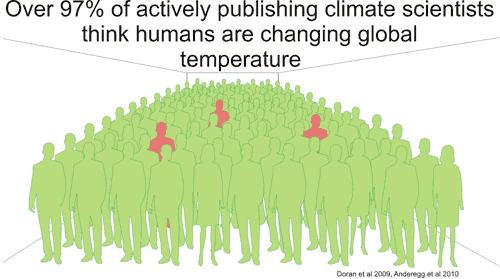What do you get when you put 100 climate scientists in a room?
Posted on 22 July 2010 by John Cook
No, this isn't a joke (although you're welcome to post a punchline in the comments if you can come up with a funny answer). Instead, I was imagining what would happen if you filled a room with the world's leading experts on climate science - the scientists who are actively publishing climate science papers in the peer-reviewed literature. If you asked this group of climate experts if they thought humans were causing global warming, what would they say? Here's a visualisation of the response (obviously green are convinced that humans are causing climate change, red are skeptical): 
Why does this matter? Does a consensus of climate experts prove that humans are causing global warming? No, science doesn't work that way. The evidence for man-made global warming lies in the multiple, independent observations that confirm man's influence on climate . It's not based just on theory or models or even just a single dataset but many different observations all pointing to a consistent result. In my quieter moments of introspection when I wonder if this could all be wrong, ultimately I can't avoid all the different lines of evidence.
But not everyone has the time or inclination to dig through the peer-reviewed literature to uncover all the empirical evidence. Or read the thousands of pages in the IPCC reports. When it comes to complex science, whether it be climate science or heart surgery or how a plane manages to stay up in the air, we defer to the experts who do this stuff for a living. Why? Because they know every nook and cranny of their area of expertise. Every day when they go to work, climate scientists are knee deep in the full body of evidence. They arrive at their opinion of man-made global warming by taking into account all this evidence. The reason why there's a consensus of scientists is because there's a consensus of evidence.































 Arguments
Arguments






























He wouldn't get in the room, he's not a climate scientist. He's a physicist, specialising primarily in spectroscopy and hasn't published any peer-reviewed research on climate science.